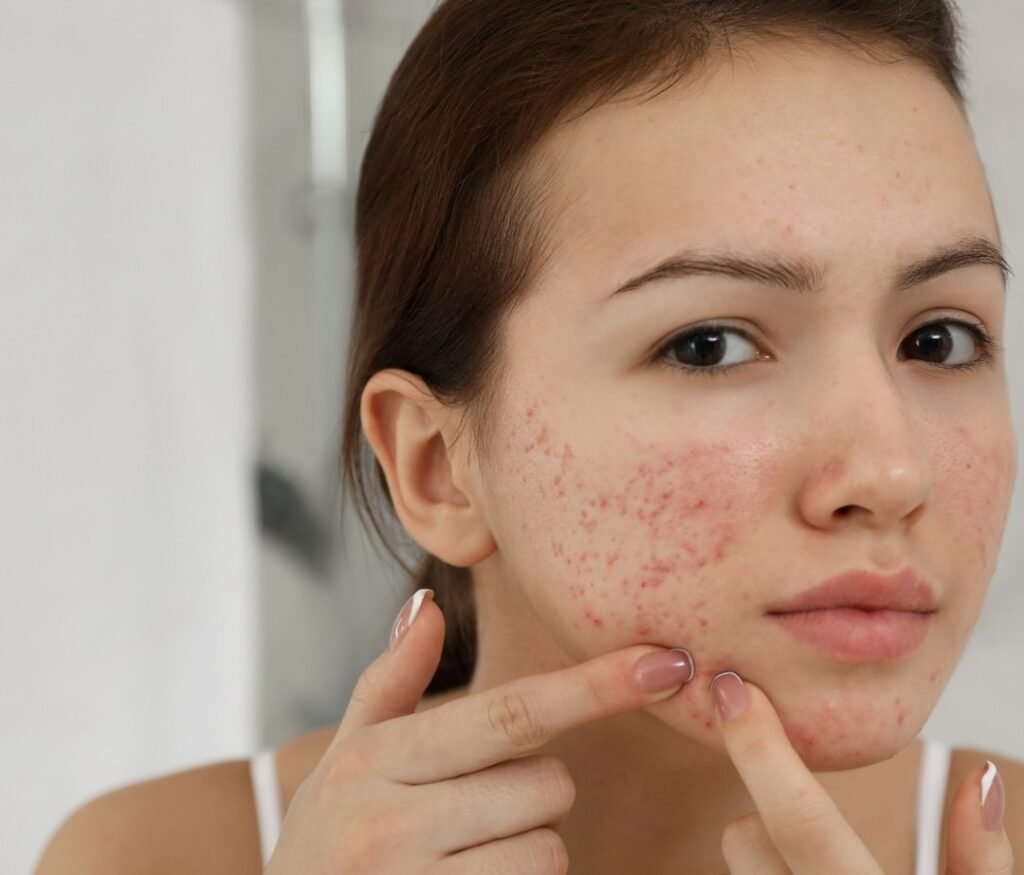
Are you using each acne treatment you may locate, yet still dealing with breakouts? The trouble may not be your merchandise but your skincare conduct. Many human beings unintentionally make errors that worsen acne-prone pores and skin, as opposed to assisting it to heal. Let’s examine 10 skincare habits – not unusual habits – that can be triggering your acne and a way to repair them with dermatologist-approved tips.
10 Skincare Habits to Stop Acne
1. Trying a New Acne Treatment Every Week
Switching merchandise too frequently irritates your pores and skin barrier and can cause new breakouts. Your skin needs time to adapt to the elements.
What to do instead:
Stick with one pimple treatment for a minimum of six to eight weeks. This lets in enough time to see outcomes. If there’s no seen development after that, try a brand new system advocated for zit-susceptible pores and skin.
2. Applying Acne Medication Only to Spots
Treating only visible zits doesn’t prevent new pimples from forming.
What to do as an alternative:
Apply a thin layer of your acne cream or gel over the entire zit-inclined region, together with your brow, chin, and nostrils. This prevents new blemishes from forming and helps keep clear skin.
3. Using Comedogenic Makeup or Hair Products
Many makeup, sunscreen, and hair products incorporate oils that clog pores and trigger breakouts.
What to do as a substitute:
Choose products categorised as “non-comedogenic”, “oil-free”, or “won’t clog pores”. These are safe for acne-prone skin and decrease the risk of pore blockages.
4. Sharing Makeup or Brushes
Even in the case that your makeup is easy, sharing gear spreads microorganisms, oil, and useless skin cells, which can cause pimple flare-ups.
What to do instead:
Never share your makeup brushes, applicators, or sponges. Clean your brushes weekly with a moderate cleanser to keep them free from zit-causing residue.
5. Sleeping in Your Makeup
Falling asleep with make-up on traps oil and dirt, leading to blocked pores and new pimples.
What to do as an alternative:
Always take away makeup earlier than your mattress. If you’re too tired, use non-comedogenic makeup wipes to smooth your face gently and maintain your sparkling pores overnight.
6. Washing Your Face Too Often
Over-cleansing strips the pores and skin’s natural oils and causes inflammation, making pimples and breakouts worse.
What to do as a substitute:
Wash your face twice each day—once as soon as it is morning and once as soon as you are about to go to bed. Also, cleanse after heavy sweating to save your clogged pores.
7. Over-Drying Your Skin
Using too many astringents, alcohol-based toners, or zit treatments can dry out your skin, leading to greater irritation and breakouts.
What to do alternatively:
Moisturise twice daily with a light, non-comedogenic moisturiser. Hydrated skin balances oil production and heals quickly.
Eight. Scrubbing Too Hard
Scrubbing your face can cause micro-tears and infection, worsening acne.
What to do as an alternative:
Use a gentle cleanser and wash with your fingertips in small circles. Rinse with lukewarm water and pat dry with a clean towel
9. Rubbing Sweat from Your Skin
During exercises, more or less wiping sweat can spread microorganisms and cause new zits.
What to do as a substitute:
Use an easy towel to gently pat away sweat. Always bathe or cleanse your face quickly after exercise to keep your skin clear.
10. Popping or Squeezing Pimples
Popping pimples can push bacteria and pus deeper into the pores and skin, causing scars, infection, and painful cysts.
What to do as an alternative:
Resist the urge to pop. Use spot treatments with benzoyl peroxide or salicylic acid. For deep cystic zits, go to a dermatologist for professional care.
When to See a Dermatologist
If you’ve attempted these kinds of suggestions and nonetheless get frequent breakouts, it’s time to consult a dermatologist. They can prescribe stronger acne treatments together with retinoids or antibiotics to clean your pores and skin correctly. Remember — healthy, glowing skin takes time, care, and consistency.
FAQs About Acne and Skincare
Q1. How long does the zit remedy take?
Most pimple treatments show consequences within six to eight weeks; however, some may take up to 12 weeks for complete development.
Q2. Can moisturisers motivate zits?
Only if they’re comedogenic. Always use a non-comedogenic moisturiser made for acne-inclined pores and skin.
Q3. Is it ok to exfoliate pimple-prone skin?
Yes, but lightly. Use moderate exfoliants with salicylic acid a couple of times per week to avoid infection.
Yes. Stress triggers hormonal modifications that increase oil production, leading to greater breakouts.
Conclusion
Breaking horrific skincare habits could make a big difference in handling acne-prone pores and skin. Consistency is fundamental — persist with mild products, keep away from irritation, and let your skin heal clearly. For stubborn pimples, professional dermatologist remedies let you attain clean, clear pores and skin once more.

